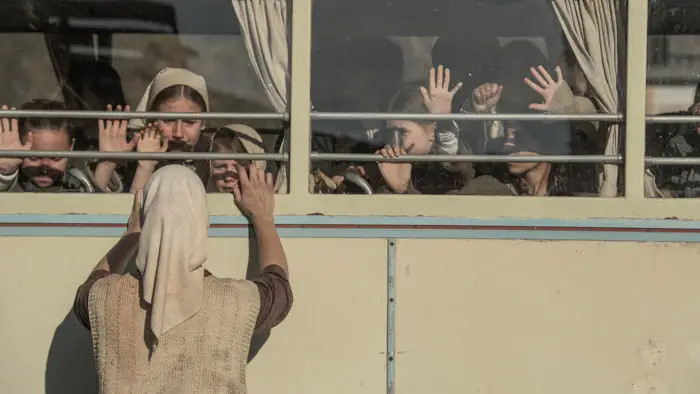DARA OF JASENOVAC (DARA IZ JASENOVAC)
(director: Predrag Antonijevic; screenwriter: Natasa Drakulic; cinematographer: Milos Kodemo; editor: Filip Dedic; music: Aleksandra Kovac/Maksa Catovic; cast: Natasa Ninkovic (Radojka), Natasa Drakulic (Jovanka Koncar), Vuk Kostic (Fra Miroslav Filipovic ‘Majstorovic’), Biljana Cekic (Dara), Igor Djordjevic (Ante Vrban), Marko Janketić (Maks Luburic), Marko Pipić (Jovo Ilic), Zlatan Vidović (Mile Ilic), Alisa Radaković (Nada Sakic), Petar Durdivić (Dinko Shakic), Anja Stanić Ilić (Nada Ilic), Petar Zekavica (Nemacki Oficir), Tatjana Kecman (Casna Sestra, cruel guard), Jelena Grujčić (Blankica), Luka Jakoy (Bude Ilic); Runtime: 130 ; MPAA Rating: R; producer: Predrag Antonijevic; Dandelion Production; 2020-Serbia-in Serbian and Croatin with English subtitles)
“A gross film that lacks subtlety as well as taste.”
Reviewed by Dennis Schwartz
Predrag Antonijevic (“A Soldier’s Courage”/”Savior”) is a Serbian filmmaker who directs this unpleasant World War II Holocaust film that rightfully condemns his country’s long-standing enemy Croatia for its support of the Nazis during the war. It tells of the Croatian fascist government during World War II, the Ustaše, who were murderous thugs helped by top members of the Catholic Church to set-up concentration camps. One of the worse was the Jasenovac complex where approximately 80,000 inmates, mostly Serbs, were killed there between 1941 and 1945.
In the 1940s, 10-year-old Dara (Biljana Cekic) is sent with her mother Nada (Anja Stanić Ilić) and her sibling older brother Jovo (Marko Pipić) and 2-year-old brother Bude (Luka Jakoy), to the Jasenovac concentration camp. Her Dad (Zlatan Vidović) was sent to the camp that housed the men, the neighboring camp of Gradina. These Croatian death camps were the only ones in the world during the war not created or run by the Germans. The Croatians used it to take care of their so-called Serbian, Jewish and Roma problem.
The story follows Dara, who must find the courage to protect her baby brother and herself in this inhuman place.
On one occasion, camp commander Maks Luburić (Marko Janketić) provides entertainment for a visiting German Nazi officer of musical chairs, in which whoever doesn’t find a seat gets his throat slashed by camp officer Ante Vrban (Igor Djordjević) using a cuff-and-knife contraption. While Dara watches in schock as the blood-splatter, Maks’ half-sister Nada (Alisa Radaković) gets so sexually excited by the blood spill that she and hubby Dinko Šakić (Petar Durdivić) screw in their car. You couldn’t ask for a more gross scene in a gross film that lacks subtlety as well as taste.
Dara’s mom and older brother are shot dead the next morning. Fortunately Dara and the toddler are looked after by a Jewish inmate (Jelena Grujčić) and survives, and plans her escape.
The Holocaust film gives us more hate to deal with in a place in the world that exploded with ethnic cleansing wars in the 1990s, that were fueled by the bitterness still raging from the war years.
This is the first-ever feature about the Jasenovac camp. The screenplay by Natasa Drakulic sets out to show us the hatred that exists between the Serbs and the Croatians, and we can certainly see why the Serbs hate the Croatians. It was filmed by Milos Kodemo in the villages of Kolut and Bela Crkva, Serbia, and the cast consisted of mostly non-professionals.

REVIEWED ON 2/21/2021 GRADE: C